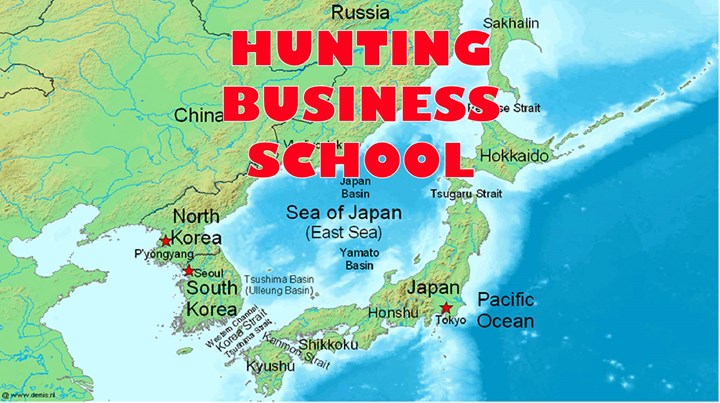
by Brian McCombie - Saturday, December 29, 2018

Various locations around Japan report significant problems with wildlife destroying millions of dollars’ worth of agricultural crops. To combat this, one Japanese city is trying to interest people in hunting—as a business opportunity.
As a recent article in Japan Today reported, the city of Kimitsu, in the Chiba Prefecture near Tokyo, has started a "business school for hunting." The courses, set to launch in the spring of 2019, will “introduce people to the pursuit of game and encourage them to consider it as a source of livelihood … .” The livelihood part will be encouraged by teaching people and owners of local restaurants how to use game meat in everyday cooking and eating.
“According to Kimitsu city, its agricultural damage caused by wild animals in fiscal 2017 amounted to 460 million yen ($4.1 million), the highest in Chiba Prefecture. More than 4,000 wild boars and [sika] deer were captured. But the city's three meat processing plants could not catch up with the amount of game caught, and most of it had to be destroyed. The city is thus seeking to make hunting and game meat into a business, making it a new specialty.”
Unfortunately, it may take much more than a business school for hunting to get more Japanese sportsmen afield, given the country’s extremely restrictive firearm laws. And, much as we have seen here in the United States, those who currently do hunt are part of an aging demographic. Meanwhile, interest from younger generations seems limited.
According to an article in the Japan Times, Japan’s National Police Agency, working through local public safety commissions, decides who can and can’t possess a firearm in that nation.
The article explains that the vetting process is strict. Applicants must attend a lecture, pass a written test and practice with a police-provided 12-gauge shotgun. Once permission is granted, the gun must be purchased from a licensed dealer. The buyer must then take it to the police to show them it is the one for which he or she applied.
The vetting process includes background checks where the police interview family members, friends, neighbors and co-workers about the applicant. Anything the police feel is a negative in the applicant’s background or life can get the applicant removed from consideration. Even if approved, the applicant is only permitted to purchase a shotgun.
“Anyone seeking to acquire a rifle in principle would have to have owned a shotgun for at least 10 years, and fulfill a separate set of requirements and paperwork. Some prefectural police forces are quite strict and rarely issue rifle permits—even if the applicant is qualified. Pistols are not legally available to civilians.”
Having a firearm finally in hand is just the beginning as firearms must be stored in police-approved gun lockers, and ammunition must be stored separately. As the article explains, separate police permission is needed to buy ammunition. Owners must inform the police of the location where a firearm and ammunition are being stored. Police will conduct an annual inspection to ensure compliance. Gun owners must retake the police-permit exam every three years.
Potential hunters must also take a training course and purchase the appropriate licenses. It’s a costly journey, from firearms applicant to Japanese gun owner ready to begin hunting. Japan Times estimated that cost at 115,000 yen—or about $1,020 U.S. dollars—and that was in 2013. Inflation has likely pushed up that number.
According to a Japan Times article from 2015, “While the total number of licensed hunters dropped steeply after hitting a high of 518,000 in 1975, the number has stayed relatively steady since reaching 210,000 in 2000. In 2011, for example, the figure was 198,000, according to figures compiled by the Ministry of the Environment. Meanwhile, 66 percent of those, or 131,000, are over 60 years old. It doesn’t take a statistician to work out that the situation will reach crisis levels as more elderly retire their guns.”
And getting younger generations interested in hunting seems as difficult in Japan as it does in the Untied States. Add in the many hurdles Japanese citizens face to simply own a firearm? A “business school of hunting” may help, but it seems that larger changes must be made—legally and culturally—before Japan has the necessary number of hunters who can manage wildlife populations sufficiently to help the nation’s hard-hit farmers.
E-mail your comments/questions about this site to:
[email protected]
